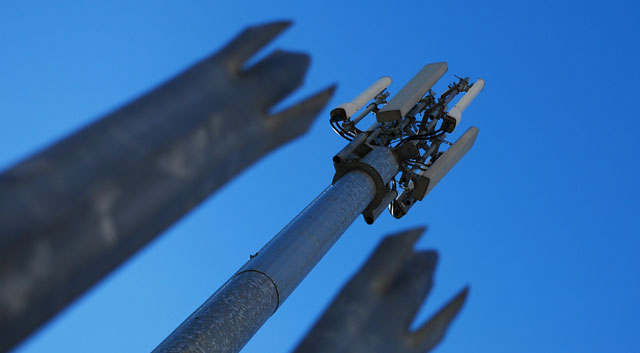
A radical Islamist sect that has attacked mosques, churches, schools and government buildings at will in Nigeria appears to have added a new target for its violence: mobile phone towers.
Attacks in the last day have damaged more than 30 towers operated by all the major providers in the country, further straining the one link the nation relies on for communication in a country with nearly no landlines. While no one has claimed responsibility for the attacks, the Islamist sect known as Boko Haram threatened mobile phone companies six months ago, warning that they would be targeted for cooperating with the government to flush out its members.
The assaults, which continued into Thursday morning, appear to be “an attack on the telecoms industry”, said Gbenga Adebayo, the chairman of the Association of Licensed Telecommunications Operators of Nigeria. It also would be a further strain on people living in a region long under attack by the radical sect.
“We are worried because this infrastructure is meant to serve the public,” Adebayo told The Associated Press. “So an attack on infrastructure is an attack on the public itself.”
Communications across north-east Nigeria remained difficult Thursday, with residents unable to connect calls or having them drop in mid-conversation. Internet service also was poor, as most access the Web through mobile phone networks. It could take months for service to improve in the region, especially if attacks continue as other companies have been leery of sending staff to the region.
In Nigeria, home to more than 160m people, mobile phones serve as a valuable lifeline across both cities and rural communities. Landlines remain almost nonexistent, as the state-run telephone company has collapsed and repeated efforts to privatise it have failed. More than 87m mobile phone lines were in use in 2009, according to estimates.
A survey Thursday by AP journalists across northern Nigeria found at least 31 attacks occurred in six states, spread from the central state of Kano to the far eastern state of Borno. In Maiduguri, the capital of Borno state where Boko Haram began, an AP journalist saw and received information about 13 burned mobile towers. The journalist also saw the burned remains of what used to be the city’s main office for South Africa-based MTN Group Ltd., Nigeria’s largest cell network provider.
MTN acknowledged in a statement on Thursday that “attacks have been made on some of its installations in northern Nigeria by unknown persons” and that customers may experience outright network failure following the attacks. Typically, a mobile phone will continue to seek a signal at another nearby tower, meaning networks can quickly be overloaded if towers go offline.
“We are intensifying efforts to restore normal services as soon as possible,” MTN executive Akinwale Goodluck said in the statement.
Officials with Bharti Airtel of India, Abu Dhabi-based Etisalat and local firm Globacom, the nation’s other major telecommunications firms, could not be immediately reached for comment Thursday. However, Adebayo said the attacks affected all four companies and five others.
In neighboring Adamawa state, attackers set ablaze five towers in the town of Mubi, Adamawa state police spokesman Ibrahim Muhammad said. He said that two civilians were shot dead in the late night attacks. An AP journalist also saw two burned masts in Kano, the capital of Kano state.
In the north-eastern town of Potiskum in Yobe state, young men shouting “God is great” in Arabic set one tower ablaze after soaking it in petrol, resident Hamadu Mohamed said. An AP reporter saw two other damaged masts in the town, and a fourth in the nearby city of Damaturu. Five other towers were later found destroyed in the region, the AP journalist said. In Gombe state’s capital of Gombe, another mast was attacked in the city centre.
Gunmen also made attempts to attack two other towers in Bauchi, the capital of Bauchi state, witnesses said.
Police in the region said they were investigating the attacks, which some officials initially blamed on Boko Haram, a sect whose name means “Western education is sacrilege” in the Hausa language of Nigeria’s Muslim north. More than 660 people have died in drive-by killings and bombings blamed on Boko Haram this year alone, according to an AP count. The sect has demanded the release of all its captive members and has called for strict Shariah law to be implemented across the entire country.
Insecurity in parts of Nigeria most affected by Boko Haram attacks makes phone communication all the more important.
“People had to come to check on me today because they heard that my mast had been attacked,” said Jibrila Ahmadu, a security guard for a tower in Maiduguri, a city which suffers near-daily attacks.
He said his phone, as many others, had no signal and wondered how people would cope to reach loved ones or know what places to avoid.
These attacks would represent the first time the sect specifically targeted mobile phone companies. However, in a February conversation with local journalists, a Boko Haram spokesman using the nom de guerre Abul Qaqa said the sect would target the firms for allegedly revealing information about the sect’s followers. Nigeria recently made mobile phone users register their numbers by giving their fingerprints and a photograph, as well as other details about their lives. Nigeria’s military and security services also have tracked suspected terrorists in the past by their mobile phones.
Attacking mobile phone towers also would be taking a page from Afghanistan’s Taliban, which Boko Haram once described itself as in Nigeria. In Afghanistan, Taliban fighters have bombed and attacked mobile phone towers, forcing many companies to either have armed guards protect them or simply shut them off at night to avoid angering the group. The US and Nato were using the fighters’ cellphone signals to track them at night and launch pinpoint attacks. — Sapa-AP

